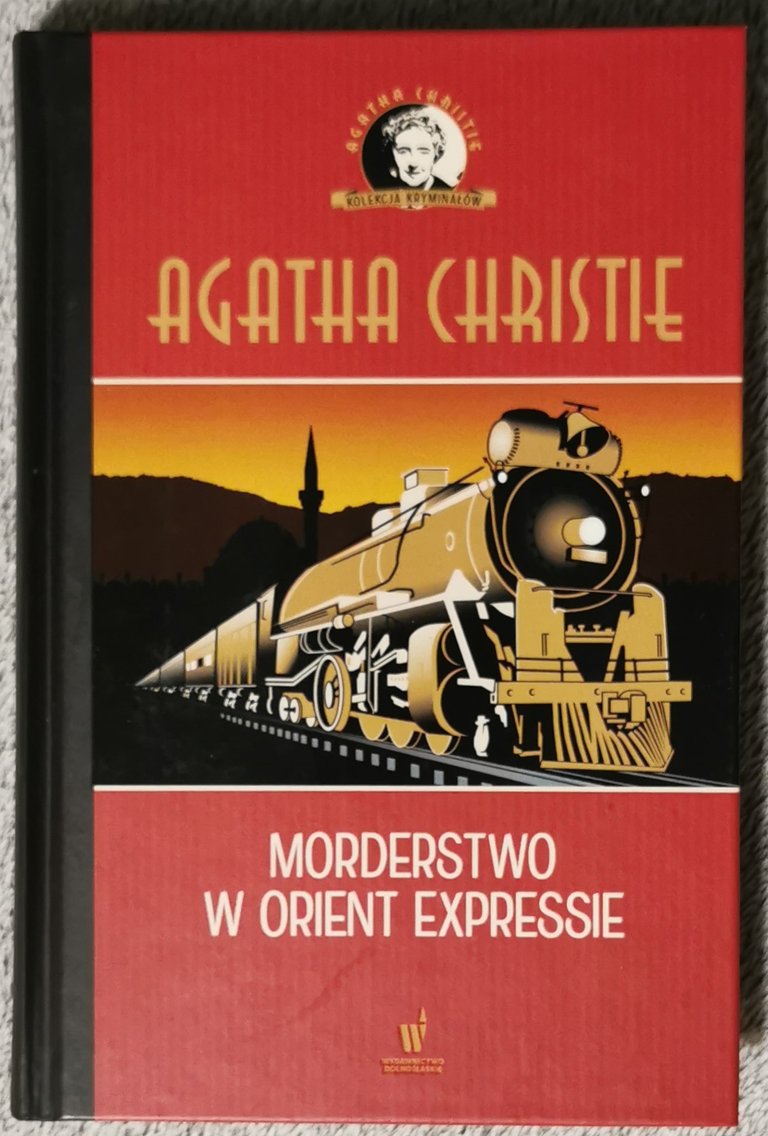
| Na hasło „kryminał” jednym z pierwszych skojarzeń, jeśli w ogóle nie pierwszym, będzie Agatha Christie i Hercules Poirot. Powieści brytyjskiej autorki to po prostu klasyka gatunku. A wśród tej klasyki jedną z najgłówniejszych książek jest „Morderstwo w Orient Expressie”. |
When you hear the words 'detective story', one of the first associations, if not the first, will be Agatha Christie and Hercules Poirot. The novels of the British author are simply classics of the genre. And one of the most important of these classics is 'Murder on the Orient Express'. |
| Utwór wydany po raz pierwszy w latach 30 XX wieku, najpierw jako gazetowa powieść w odcinkach, nie cechuje się jakąś szczególnie żywą akcją. Przeciwnie, można go uznać za dość statyczny. Mimo to jednak lektura cały czas trzyma w napięciu, a czytelnik praktycznie do samego końca nie jest w stanie odgadnąć, co tak naprawdę się stało i kto ponosi odpowiedzialność. |
First published in the 1930s, initially as a newspaper novel in episodes, the work does not have a particularly lively plot. On the contrary, it can be described as rather static. Nevertheless, the reader is constantly kept in suspense, practically unable to guess what has really happened and who is the culprit until the very end. |
| A dzieje się tak: Herkules Poirot, przebywający akurat w Stambule, zostaje pilnie wezwany do Londynu. Z wielkim trudem udaje mu się znaleźć miejsce w pociągu wyruszającym do Francji jeszcze tego samego wieczora. Gdy się wydaje, że wszystkie trudności ma już za sobą i czeka go tylko spokojna, monotonna podróż, nagle okazuje się, że wcale nie. |
And this is how it happens: Hercule Poirot, who is in Istanbul at the time, is urgently summoned to London. With great difficulty, he manages to find a place on the train that leaves for France that very evening. Just when it seems that he has put all his troubles behind him and is looking forward to a quiet, monotonous journey, it suddenly turns out that this is not going to be the case. |
| Najpierw zgłasza się do niego jeden z pasażerów, niezbyt uprzejmy Amerykanin i prosi go o przyjęcie zlecenia detektywistycznego – otrzymuje pogróżki, traktuje je poważnie i chciałby wykryć sprawcę, a tym samym zapewnić sobie bezpieczeństwo. Poirotowi jednak rozmówca nie przypada do gustu i odmawia pomimo wysokiego honorarium. Następnie – gdzieś w Chorwacji pod Vinkovcami – swoją potęgę pokazuje przyroda: pociąg utyka w śnieżnych zaspach i pasażerowie są zmuszeni bezczynnie czekać, aż uda się go odkopać. Samo to wystarczyłoby, by wywołać irytację pasażerów, z których nie tylko Poirot ma pilne sprawy i się spieszy. |
First he is approached by a passenger, a rather unfriendly American, who asks him to take on a detective assignment - as he has received threats, takes them seriously and wants to find the perpetrator to ensure his own safety. Poirot does not like the man and refuses, despite the high fee being offered. Then - somewhere in Croatia, near Vinkovci - nature shows its power: the train gets stuck in a snowdrift and the passengers are forced to wait idly until it can be dug out. This alone would be enough to annoy the passengers, of whom Poirot is not the only one who has urgent business and is in a hurry. |
| Ale tego wszystkiego jest jeszcze za mało. Nagle okazuje się, że jeden z pasażerów został zamordowany. Ten sam, który chciał wynająć Poirota. A ponieważ pociąg wciąż tkwi w zaspie i na pomoc jugosłowiańskiej policji nie ma szans, detektyw postanawia przeprowadzić śledztwo i wykryć sprawcę, w czym będą mu pomagać pan Bouc – dyrektor linii kolejowej, oraz doktor Constantine. |
But all this is still not enough. Suddenly it turns out that one of the passengers has been murdered. The same one who wanted to hire Poirot. And since the train is still stuck in a snowdrift and there is no chance of getting help from the Yugoslavian police, the detective decides to investigate and find the culprit himself, assisted by Mr Bouc - the director of the railway line - and Dr Constantine. |
| Dalsza część jest trochę schematyczna – najpierw detektyw przeprowadza indywidualne rozmowy z poszczególnymi pasażerami wagonu, których było kilkunastu, potem – przeszukuje ich przedziały. I, jak to zwykle bywa, nawet jeśli przesłuchiwani zeznają bez jakichś większych oporów, to jednak niekoniecznie mówią całą prawdę i tylko prawdę. Poirot ma więc nad czym łamać głowę. |
The rest of the story follows a certain pattern - first, the detective conducts individual interviews with each passenger in the carriage, a dozen of them, then he searches their compartments. And, as is usually the case, even when the interrogated do not hesitate to testify, they do not necessarily tell the whole truth and nothing but the truth. So Poirot has a lot to think about. |
| Dość szybko udaje mu się ustalić, że denat niekoniecznie był świętej pamięci, niekoniecznie był tym, za kogo się podawał i że miał powody, by swoją prawdziwą tożsamość ukrywać – tropy prowadzą do pewnej niewyjaśnionej zagadki ze Stanów. Trochę więcej czasu zajmuje dojście do wniosku, że bynajmniej nie był jedyną osobą w wagonie powiązaną z tą sprawą, aż wreszcie znalezienie rozwiązania. A właściwie rozwiązań – obu jednakowo spójnych, obu możliwych. Które z nich Poirot i jego pomocnicy wybiorą jako słuszne? Czy sprawiedliwość zatryumfuje? |
Pretty quickly he manages to establish that the deceased was not necessarily of blessed memory, that he was not necessarily who he claimed to be and that he had reasons to hide his true identity - the clues lead to certain unexplained mystery from the States. It takes a little more time to come to the conclusion that he was by no means the only person in the carriage connected to the case, and finally to find the solution. Or rather, two solutions - both consistent, both possible. Which one will Poirot and his assistants choose as the right one? Will justice prevail? |
| Zabierając się do lektury miałem wobec tej książki duże oczekiwania – w końcu byle jaki utwór nie zostaje uznany za klasyk, jeden z najlepszych w swojej tematyce. I muszę przyznać, że się nie rozczarowałem. Śledztwo jest wystarczająco skomplikowane, nowe odkrycia często zmieniają tok śledztwa i przyjmowane koncepcje, a jednocześnie można przynajmniej próbować za nimi nadążyć. Oczywiście, w fazie końcowej detektyw przyjmuje kilka założeń, których czytelnik raczej nie miałby szans samemu wymyślić, ale ostatecznie to on jest specjalistą, a nie my. Do tego bardzo, ale to bardzo mi się podoba samo zakończenie, lepszego chyba nie mógłbym sobie wymarzyć. Od kryminału trudno oczekiwać czegoś więcej, niż dostajemy w tej książce, jakieś tam drobne niedostatki są nieliczne i z czystym sumieniem daję 9,5 punkta. |
When I started reading, I had high expectations of this book - after all, no ordinary work is considered a classic, one of the best in its field. And I must admit that I was not disappointed. The investigation is complicated enough, new discoveries often change the course of the investigation and the concepts adopted, while at the same time you can at least try to keep up with them. Of course, in the final phase, the detective makes some assumptions that the reader is unlikely to come up with on his own, but in the end he is the expert, not us. Besides, I really, really like the ending; I don't think I could have imagined a better one. It's hard to expect more from a detective story than we get in this book, there are only a few minor flaws and I give it 9.5 points with a clear conscience. |
